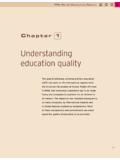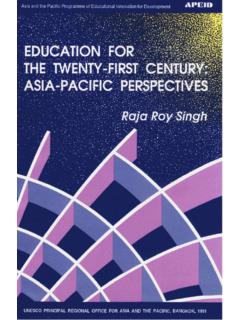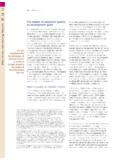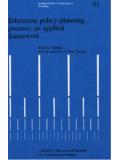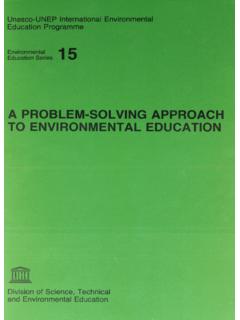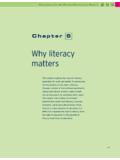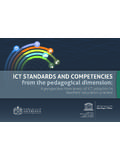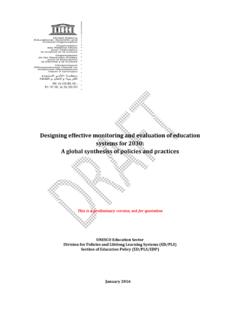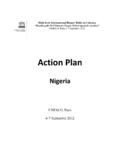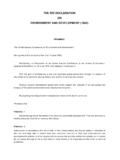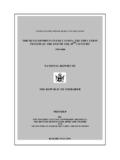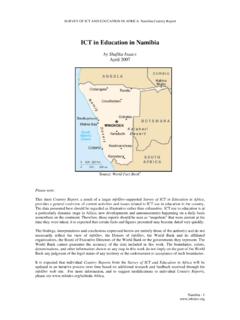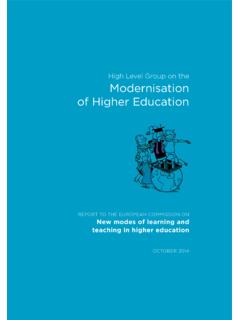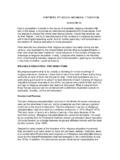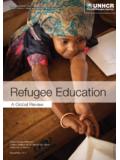Transcription of UNESCO OPERATIONAL DEFINITION OF BASIC …
1 UNESCO OPERATIONAL DEFINITION OF BASIC education Thematic Framework (December 2007) I. INTRODUCTION This Thematic Framework has been prepared with a view to facilitating discussions of the OPERATIONAL DEFINITION of BASIC education . It presents: (a) Global education main policy texts and goals set at international conferences the World Conference on education for All (1990), the World education Forum (2000) and related material like international reports like Delors report: Learning: The Treasure Within (1996) and notably recent treatment of the question on the EFA Global Monitoring Report 2008. These texts provide conceptual elements and policy perspectives. (Part ) (b) International legal texts and normative instruments in the field of education such as conventions, recommendations, declarations. This part shows that the right to BASIC education as such is not reflected in the international treaties and conventions in the field of education , though it is reflected in some of the Recommendations elaborated by UNESCO .
2 However, the provisions in the international conventions, notably the International Covenant on Economic, Social and Cultural Rights and UNESCO s Convention against Discrimination in education the right to education has been interpreted as part of the EFA process in a way so as to recognize the significance of BASIC education as a fundamental human right. Moreover, the right to BASIC education is reflected in regional level instruments, notably in Africa. (Part ) (c) Provisions in constitutions and national legislations on education adopted in recent years in various countries in the spirit of EFA. Provisions on BASIC education in constitutions in many countries are indicative of importance attached to BASIC education as a right. The education Laws, elaborated recently in several countries provide similar indications which must be borne in mind while elaborating an OPERATIONAL DEFINITION .
3 (Part ) Main issues Main issues that call for reflections relate to: (i) Conceptual questions such as use of the terms elementary education , fundamental education in international normative texts, and their contemporary perceptions within the concept of BASIC education . (ii) BASIC education as regards the level of education - considering from early childhood care and development as foundation of BASIC education , and BASIC education going beyond primary education and extending to junior secondary education . This is borne out by recent developments in national legislations. (iii) Whether BASIC education for its entire duration should be free and compulsory following evolution in national legislation in this respect in some countries notably in Nigeria, Brazil, Indonesia etc. as well as policy developments. (iv) Forms of education and BASIC education : formal as well as non-formal education , and literacy and adult education as an essential component of BASIC education .
4 The concept of education throughout life is crucial. (v) Contents and objectives of education : education for imparting BASIC learning skills and meeting BASIC learning needs; BASIC education in its interface with technical and vocational education and training. Elaboration of a draft for an OPERATIONAL DEFINITION of BASIC education Elaboration of a draft OPERATIONAL DEFINITION of BASIC education , taking into account the above Thematic Framework, and refining the preliminary DEFINITION suggested at the Expert Workshop on Challenges and Perspectives of Law and education (organised in Sao Paulo in December 2006 by the Constitutional Court of Brazil and Governmenet of State of Sao Paulo in cooperation with the Brazilian Judges Association, and with the support of UNESCO and the European Association for education Law and Policy) and elements for such a DEFINITION as mentioned in the EFA Global Monitoring Report 2008, would lead to legislation and policy change in the provision of BASIC education and to better monitoring progress regarding the implementation of the right to BASIC education .
5 II. PART A: KEY POLICY TEXTS The concept of BASIC education came to the fore following the adoption of the World Declaration on education for All (1990). In its Report presented to UNESCO Learning: The Treasure Within (1996), the International Commission on education for the Twenty-first century, stated that BASIC education is the first step in attempting to attenuate the enormous disparities affecting many groups women, rural populations, the urban poor, marginalized ethnic minorities and the millions of children not attending school and working .1 The concept of BASIC education has led to broaden the magnitude of the right to education : extending from initial or BASIC education to lifelong learning .2 Need for promoting normative action with a view to universalizing access to BASIC education is recognized in UNESCO s Medium-Term Strategy (2002-2007).
6 As the Strategy stipulates, A major task for UNESCO will be to support Member States in policy reforms, especially the design and implementation of EFA policies and action plans as well as of legal instruments for promoting universal access to BASIC education . 3 (Emphasis added). The Right to education is a multi-faceted right that has at least two dimensions that need to be fulfilled: quantitative (for everyone) qualitative (right to what education *, for how long, provided by whom and for whom and also leading to full development of the human personality fundamental to the fulfilment of other rights, freedom and maintenance of peace). * education = not equivalent only to schooling With the expansion of mass education and the increasing understanding of education as an imperative to human and national development, a great emphasis has been placed on Universal Primary education (UPE) since 1950s.
7 Since then, it has appeared as a top priority at the international education agenda. But what levels of education does primary education cover and how is the term used in relation to BASIC or secondary education ? The implementation of the right to education is inextricably linked with its interpretation and understanding reflected in international and national texts. This part therefore looks into recent key education policy documents and on how these understand and represent education during the first years of learning. Below is a list of the documents that were considered in the chronological order they have been produced: 1. UNESCO s constitution (1945) 2. Universal Declaration of Human Rights (1948) 3. World Conference on education for All, Jomtien (1990) 4. Learning: The Treasure Within: Report to UNESCO of the International Commission on education for the Twenty-first Century.
8 Highlights (1996) 5. International Standard Classification (revised 1997) 6. World education Report (2000) 1 The International Commission on education for the Twenty-first century: The Report of the Commission presented to UNESCO Learning: The Treasure Within , UNESCO , 1996 (p. 118). 2 The World education Report 2000, The Right to education : towards education for all throughout life UNESCO Publishing, 2000. 3 UNESCO s Medium Term Strategy 2002-2007 (31 C/4 para. 59), UNESCO , Paris. 7. World education Forum, The Dakar Framework for Action, EFA, (2000) 8. Millennium Development Goals (MDGs) 2000 9. EFA Global Monitoring Report 2008 Table 1: DEFINITION of terms. Source: Oxford Dictionary4 BASIC (adjective) 1. forming an essential foundation; fundamental Elementary (adjective) 1. relating to the most rudimentary aspects of a subject 2.
9 Not decomposable into elements or other primary constituents Fundamental (adjective) 1. of or serving as a foundation or core; of central importance Primary (adjective) 1. relating to education for children between the ages of about five and eleven (Adopted in London, 16 November 1945, and amended by the General Conference at its 2nd, 3rd, 4th, 5th, 6th, 7th, 8th, 9th, 10th, 12th, 15th, 17th, 19th, 20th, 21st, 24th, 25th, 26th, 27th, 28th, 29th and 31st sessions.) UNESCO s constitution makes extensive reference to education and its importance in contributing to peace and security by promoting collaboration among the nations . Although it does not make specific reference to levels of education or modes of delivery, this lays the basis of understanding the purpose of education UNESCO is promoting. education is considered as a sacred duty for countries to fulfil, supporting educational opportunities for all and educational methods best suited to prepare children of the world for the responsibilities of freedom.
10 4 Accessed 10 October 2007 1. UNESCO s Constitution (1945) The Governments of the States Parties to this Constitution on behalf of their peoples declare: That since wars begin in the minds of men, it is in the minds of men that the defences of peace must be constructed; That the wide diffusion of culture, and the education of humanity for justice and liberty and peace are indispensable to the dignity of man and constitute a sacred duty which all the nations must fulfil in a spirit of mutual assistance and concern; For these reasons, the States Parties to this Constitution, believing in full and equal opportunities for education for all, in the unrestricted pursuit of objective truth, and in the free exchange of ideas and knowledge, are agreed and determined to develop and to increase the means of communication between their peoples and to employ these means for the purposes of mutual understanding and a truer and more perfect knowledge of each other s lives; Article I Purposes and functions 1.
